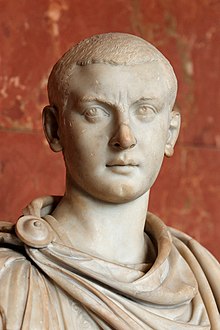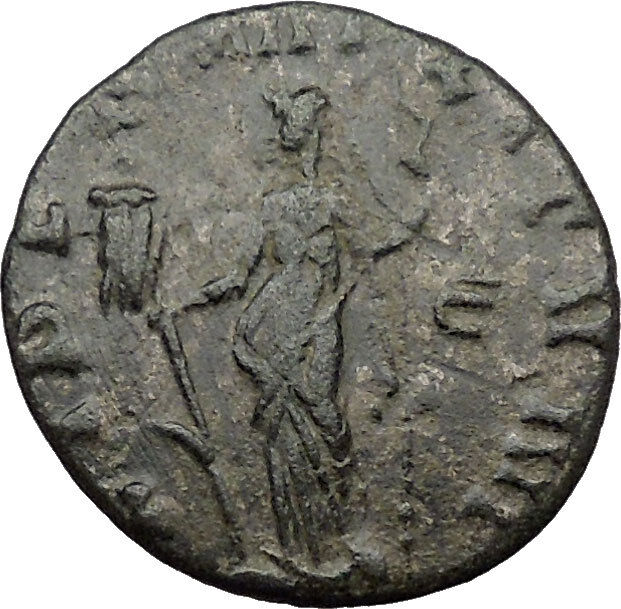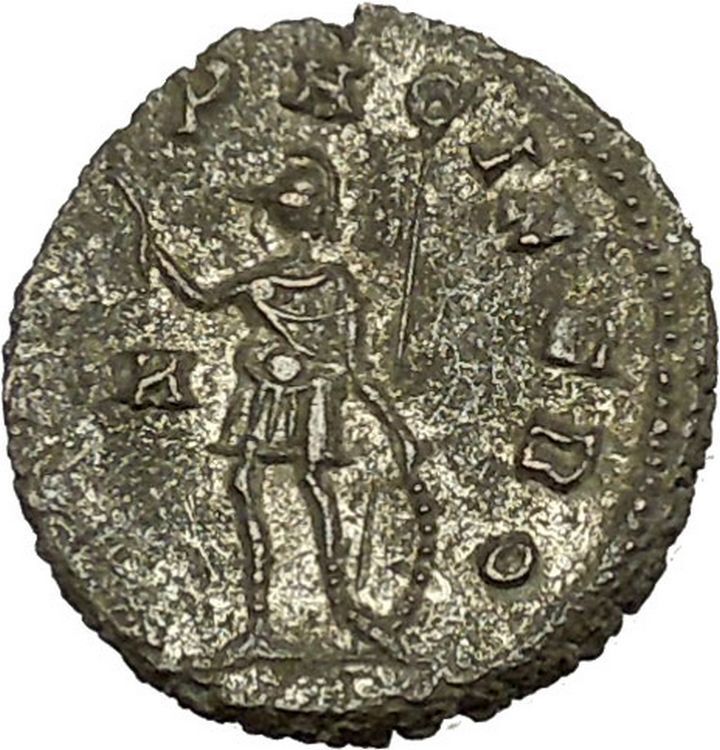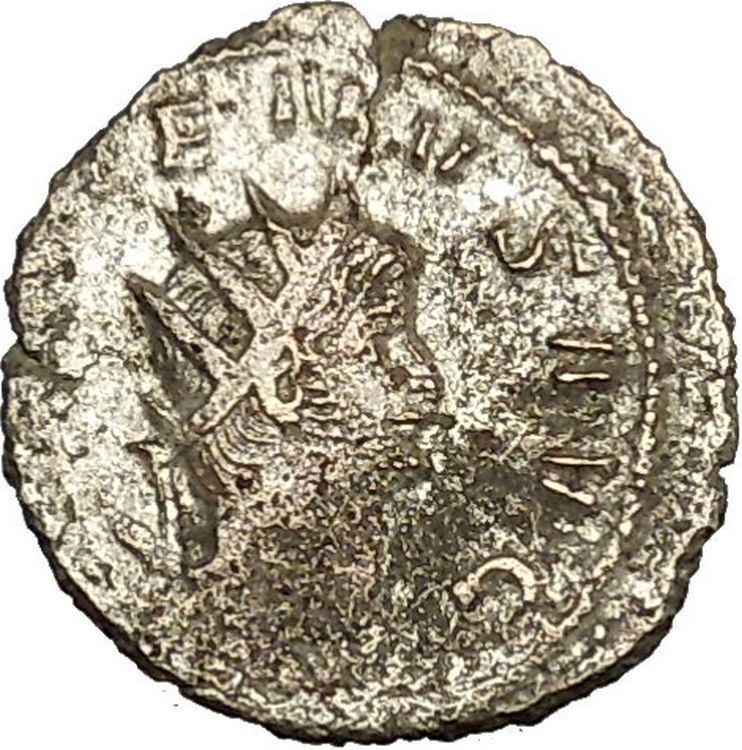|
Gordian III – Roman Emperor: 238-244 A.D.
Silver Antoninianus 20mm (3.33 grams) Rome mint, struck 241-243 A.D.
Reference: RIC 84; RSC 109; Sear 8615
IMP GORDIANVS PIVS FEL AVG, radiate draped bust right.
IOVI STATORI, Jupiter standing right with scepter and thunderbolt.
You are bidding on the exact item pictured, provided with a Certificate of Authenticity and Lifetime Guarantee of Authenticity.
 Jupiter, called Zeus by the Greeks. Jupiter was originally an elemental divinity, and his name signifies the father or lord of heaven, being a contraction of Diovis pater, or Diespiter. Being the lord of heaven, he was worshipped as the god of rain, storms, thunder, and lightning, whence he had the epithets of Pluvius, Fulgurator, Tonitrualis, Tonans, and Fulminator. As the pebble or flint stone was regarded as the symbol of lightning, Jupiter was frequently represented with such a stone in his hand instead of a thunderbolt. In concluding a treaty, the Romans took the sacred symbols of Jupiter, viz. the sceptre and flint stone, together with some grass from his temple, and the oath taken on such an occasion was expressed by per Jovem Lapidem jurare. In consequence of his possessing such powers over the elements, and especially of his always having the thunderbolt at his command, he was regarded as the highest and most powerful among the gods. Hence he is called the Best and Most High (Optimus Maximus). His temple at Rome stood on the lofty hill of the Capitol, whence he derived the surnames of Capitolinus and Tarpeius. He was regarded as the special protector of Rome. As such he was worshipped by the consuls on entering upon their office ; and the triumph of a victorious general was a solemn procession to his temple. He therefore bore the surnames of Imperator, Victor, Invictus, Stator, Opihdus, Feretrius, Praedator, Triumphator, and the like. Under all these surnames he had temples or statues at Rome ; and 2 temples, viz. those of Jupiter Stator and of Jupiter Feretrius, were believed to have been built in the time of Romulus. Under the name of Jupiter Capitolinus, he presided over the great Roman games ; and under the name of Jupiter Latialis or Latiaris, over the Feriae Latinae. Jupiter, according to the belief of the Romans, determined the course of all human affairs. He foresaw the future, and the events happening in it were the results of his will. He revealed the future to man through signs in the heavens and the flight of birds, which are hence called the messengers of Jupiter, while the god himself is designated as Prodigialis, that is, the sender of prodigies. For the same reason the god was invoked at the beginning of every undertaking, whether sacred or profane, together with Janus, who blessed the beginning itself. Jupiter was further regarded as the guardian of law, and as the protector of justice and virtue. He maintained the sanctity of an oath, and presided over all transactions which were based upon faithfulness and justice. Hence Fides was his companion on the Capitol, along with Victoria ; and hence a traitor to his country, and persons guilty of perjury, were thrown down from the Tarpeian rock. – As Jupiter was the lord of heaven, and consequently the prince of light, the white colour was sacred to him, white animals were sacrificed to him, his chariot was believed to be drawn by 4 white horses, his priests wore white caps, and the consuls were attired in white when they offered sacrifices in the Capitol the day they entered on their office. The worship of Jupiter at Rome was under the special care of the Flamen Dialis, who was the highest in rank of all the flamens. {The Romans, in their representations of the god, adopted the type of the Greek Zeus. Jupiter, called Zeus by the Greeks. Jupiter was originally an elemental divinity, and his name signifies the father or lord of heaven, being a contraction of Diovis pater, or Diespiter. Being the lord of heaven, he was worshipped as the god of rain, storms, thunder, and lightning, whence he had the epithets of Pluvius, Fulgurator, Tonitrualis, Tonans, and Fulminator. As the pebble or flint stone was regarded as the symbol of lightning, Jupiter was frequently represented with such a stone in his hand instead of a thunderbolt. In concluding a treaty, the Romans took the sacred symbols of Jupiter, viz. the sceptre and flint stone, together with some grass from his temple, and the oath taken on such an occasion was expressed by per Jovem Lapidem jurare. In consequence of his possessing such powers over the elements, and especially of his always having the thunderbolt at his command, he was regarded as the highest and most powerful among the gods. Hence he is called the Best and Most High (Optimus Maximus). His temple at Rome stood on the lofty hill of the Capitol, whence he derived the surnames of Capitolinus and Tarpeius. He was regarded as the special protector of Rome. As such he was worshipped by the consuls on entering upon their office ; and the triumph of a victorious general was a solemn procession to his temple. He therefore bore the surnames of Imperator, Victor, Invictus, Stator, Opihdus, Feretrius, Praedator, Triumphator, and the like. Under all these surnames he had temples or statues at Rome ; and 2 temples, viz. those of Jupiter Stator and of Jupiter Feretrius, were believed to have been built in the time of Romulus. Under the name of Jupiter Capitolinus, he presided over the great Roman games ; and under the name of Jupiter Latialis or Latiaris, over the Feriae Latinae. Jupiter, according to the belief of the Romans, determined the course of all human affairs. He foresaw the future, and the events happening in it were the results of his will. He revealed the future to man through signs in the heavens and the flight of birds, which are hence called the messengers of Jupiter, while the god himself is designated as Prodigialis, that is, the sender of prodigies. For the same reason the god was invoked at the beginning of every undertaking, whether sacred or profane, together with Janus, who blessed the beginning itself. Jupiter was further regarded as the guardian of law, and as the protector of justice and virtue. He maintained the sanctity of an oath, and presided over all transactions which were based upon faithfulness and justice. Hence Fides was his companion on the Capitol, along with Victoria ; and hence a traitor to his country, and persons guilty of perjury, were thrown down from the Tarpeian rock. – As Jupiter was the lord of heaven, and consequently the prince of light, the white colour was sacred to him, white animals were sacrificed to him, his chariot was believed to be drawn by 4 white horses, his priests wore white caps, and the consuls were attired in white when they offered sacrifices in the Capitol the day they entered on their office. The worship of Jupiter at Rome was under the special care of the Flamen Dialis, who was the highest in rank of all the flamens. {The Romans, in their representations of the god, adopted the type of the Greek Zeus.
Gordian III – Roman Emperor: 238-244 A.D.
Caesar: 238 A.D. (under Balbinus and Pupienus)
Augustus: 238-244 A.D.
| Grandson of Gordian I | Nephew of Gordian II | Adopted Successor of Balbinus and Pupienus | Husband of Tranquillina |

Gordian III (Latin: Marcus Antonius Gordianus Pius Augustus; 20 January 225 AD – 11 February 244 AD) was Roman Emperor from 238 AD to 244 AD. At the age of 13, he became the youngest sole legal Roman emperor throughout the existence of the united Roman Empire. Gordian was the son of Antonia Gordiana and an unnamed Roman Senator who died before 238. Antonia Gordiana was the daughter of Emperor Gordian I and younger sister of Emperor Gordian II. Very little is known of his early life before his acclamation. Gordian had assumed the name of his maternal grandfather in 238 AD.
In 235, following the murder of Emperor Alexander Severus in Moguntiacum (modern Mainz), the capital of the Roman province Germania Superior, Maximinus Thrax was acclaimed Emperor. In the following years, there was a growing opposition against Maximinus in the Roman senate and amongst the majority of the population of Rome. In 238 a rebellion broke out in the Africa Province, where Gordian’s grandfather and uncle, Gordian I and II, were proclaimed joint emperors. This revolt was suppressed within a month by Cappellianus, governor of Numidia and a loyal supporter of Maximinus Thrax. The elder Gordians died, but public opinion cherished their memory as peace-loving and literate men, victims of Maximinus’ oppression.
Meanwhile, Maximinus was on the verge of marching on Rome and the Senate elected Pupienus and Balbinus as joint emperors. These senators were not popular men and the population of Rome was still shocked by the elder Gordian’s fate, so the Senate decided to take the teenager Gordian, rename him Marcus Antonius Gordianus like his grandfather, and raise him to the rank of Caesar and imperial heir. Pupienus and Balbinus defeated Maximinus, mainly due to the defection of several legions, particularly the II Parthica, who assassinated Maximinus. However, their joint reign was doomed from the start with popular riots, military discontent and an enormous fire that consumed Rome in June 238. On July 29, Pupienus and Balbinus were killed by the Praetorian Guard and Gordian proclaimed sole emperor.
Rule
Due to Gordian’s age, the imperial government was surrendered to the aristocratic families, who controlled the affairs of Rome through the Senate. In 240, Sabinianus revolted in the African province, but the situation was quickly brought under control. In 241, Gordian was married to Furia Sabinia Tranquillina, daughter of the newly appointed praetorian prefect, Timesitheus. As chief of the Praetorian Guard and father in law of the Emperor, Timesitheus quickly became the de facto ruler of the Roman Empire.
In the 3rd century, the Roman frontiers weakened against the Germanic tribes across the Rhine and Danube, and the Sassanid Empire across the Euphrates increased its own attacks. When the Persians under Shapur I invaded Mesopotamia, the young emperor opened the doors of the Temple of Janus for the last time in Roman history, and sent a large army to the East. The Sassanids were driven back over the Euphrates and defeated in the Battle of Resaena (243). The campaign was a success and Gordian, who had joined the army, was planning an invasion of the enemy’s territory, when his father-in-law died in unclear circumstances. Without Timesitheus, the campaign, and the Emperor’s security, were at risk.
Gaius Julius Priscus and, later on, his own brother Marcus Julius Philippus, also known as Philip the Arab, stepped in at this moment as the new Praetorian Prefects and the campaign proceeded. Around February 244, the Persians fought back fiercely to halt the Roman advance to Ctesiphon. Persian sources claim that a battle occurred (Battle of Misiche) near modern Fallujah (Iraq) and resulted in a major Roman defeat and the death of Gordian III. Roman sources do not mention this battle and suggest that Gordian died far away from Misiche, at Zaitha (Qalat es Salihiyah) in northern Mesopotamia. Modern scholarship does not unanimously accept this course of the events. One view holds that Gordian died at Zaitha, murdered by his frustrated army, while the role of Philip is unknown. Other scholars, such as Kettenhofen, Hartman and Winter have concluded that Gordian died in battle against the Sassanids.
Philip transferred the body of the deceased emperor to Rome and arranged for his deification. Gordian’s youth and good nature, along with the deaths of his grandfather and uncle and his own tragic fate at the hands of the enemy, earned him the lasting esteem of the Romans. The soldiers held Gordian in high esteem, as he had possibly sacrificed his life to save them in 244.
|





 Jupiter, called Zeus by the Greeks. Jupiter was originally an elemental divinity, and his name signifies the father or lord of heaven, being a contraction of Diovis pater, or Diespiter. Being the lord of heaven, he was worshipped as the god of rain, storms, thunder, and lightning, whence he had the epithets of Pluvius, Fulgurator, Tonitrualis, Tonans, and Fulminator. As the pebble or flint stone was regarded as the symbol of lightning, Jupiter was frequently represented with such a stone in his hand instead of a thunderbolt. In concluding a treaty, the Romans took the sacred symbols of Jupiter, viz. the sceptre and flint stone, together with some grass from his temple, and the oath taken on such an occasion was expressed by per Jovem Lapidem jurare. In consequence of his possessing such powers over the elements, and especially of his always having the thunderbolt at his command, he was regarded as the highest and most powerful among the gods. Hence he is called the Best and Most High (Optimus Maximus). His temple at Rome stood on the lofty hill of the Capitol, whence he derived the surnames of Capitolinus and Tarpeius. He was regarded as the special protector of Rome. As such he was worshipped by the consuls on entering upon their office ; and the triumph of a victorious general was a solemn procession to his temple. He therefore bore the surnames of Imperator, Victor, Invictus, Stator, Opihdus, Feretrius, Praedator, Triumphator, and the like. Under all these surnames he had temples or statues at Rome ; and 2 temples, viz. those of Jupiter Stator and of Jupiter Feretrius, were believed to have been built in the time of Romulus. Under the name of Jupiter Capitolinus, he presided over the great Roman games ; and under the name of Jupiter Latialis or Latiaris, over the Feriae Latinae. Jupiter, according to the belief of the Romans, determined the course of all human affairs. He foresaw the future, and the events happening in it were the results of his will. He revealed the future to man through signs in the heavens and the flight of birds, which are hence called the messengers of Jupiter, while the god himself is designated as Prodigialis, that is, the sender of prodigies. For the same reason the god was invoked at the beginning of every undertaking, whether sacred or profane, together with Janus, who blessed the beginning itself. Jupiter was further regarded as the guardian of law, and as the protector of justice and virtue. He maintained the sanctity of an oath, and presided over all transactions which were based upon faithfulness and justice. Hence Fides was his companion on the Capitol, along with Victoria ; and hence a traitor to his country, and persons guilty of perjury, were thrown down from the Tarpeian rock. – As Jupiter was the lord of heaven, and consequently the prince of light, the white colour was sacred to him, white animals were sacrificed to him, his chariot was believed to be drawn by 4 white horses, his priests wore white caps, and the consuls were attired in white when they offered sacrifices in the Capitol the day they entered on their office. The worship of Jupiter at Rome was under the special care of the Flamen Dialis, who was the highest in rank of all the flamens. {The Romans, in their representations of the god, adopted the type of the Greek Zeus.
Jupiter, called Zeus by the Greeks. Jupiter was originally an elemental divinity, and his name signifies the father or lord of heaven, being a contraction of Diovis pater, or Diespiter. Being the lord of heaven, he was worshipped as the god of rain, storms, thunder, and lightning, whence he had the epithets of Pluvius, Fulgurator, Tonitrualis, Tonans, and Fulminator. As the pebble or flint stone was regarded as the symbol of lightning, Jupiter was frequently represented with such a stone in his hand instead of a thunderbolt. In concluding a treaty, the Romans took the sacred symbols of Jupiter, viz. the sceptre and flint stone, together with some grass from his temple, and the oath taken on such an occasion was expressed by per Jovem Lapidem jurare. In consequence of his possessing such powers over the elements, and especially of his always having the thunderbolt at his command, he was regarded as the highest and most powerful among the gods. Hence he is called the Best and Most High (Optimus Maximus). His temple at Rome stood on the lofty hill of the Capitol, whence he derived the surnames of Capitolinus and Tarpeius. He was regarded as the special protector of Rome. As such he was worshipped by the consuls on entering upon their office ; and the triumph of a victorious general was a solemn procession to his temple. He therefore bore the surnames of Imperator, Victor, Invictus, Stator, Opihdus, Feretrius, Praedator, Triumphator, and the like. Under all these surnames he had temples or statues at Rome ; and 2 temples, viz. those of Jupiter Stator and of Jupiter Feretrius, were believed to have been built in the time of Romulus. Under the name of Jupiter Capitolinus, he presided over the great Roman games ; and under the name of Jupiter Latialis or Latiaris, over the Feriae Latinae. Jupiter, according to the belief of the Romans, determined the course of all human affairs. He foresaw the future, and the events happening in it were the results of his will. He revealed the future to man through signs in the heavens and the flight of birds, which are hence called the messengers of Jupiter, while the god himself is designated as Prodigialis, that is, the sender of prodigies. For the same reason the god was invoked at the beginning of every undertaking, whether sacred or profane, together with Janus, who blessed the beginning itself. Jupiter was further regarded as the guardian of law, and as the protector of justice and virtue. He maintained the sanctity of an oath, and presided over all transactions which were based upon faithfulness and justice. Hence Fides was his companion on the Capitol, along with Victoria ; and hence a traitor to his country, and persons guilty of perjury, were thrown down from the Tarpeian rock. – As Jupiter was the lord of heaven, and consequently the prince of light, the white colour was sacred to him, white animals were sacrificed to him, his chariot was believed to be drawn by 4 white horses, his priests wore white caps, and the consuls were attired in white when they offered sacrifices in the Capitol the day they entered on their office. The worship of Jupiter at Rome was under the special care of the Flamen Dialis, who was the highest in rank of all the flamens. {The Romans, in their representations of the god, adopted the type of the Greek Zeus.





